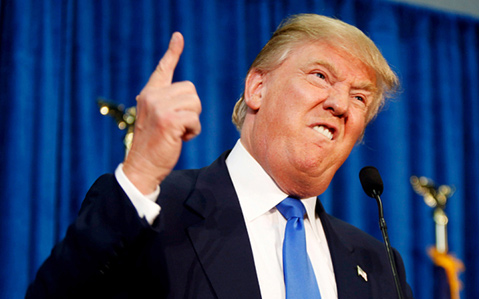By the Numbers
Even the Most Bizarre Presidential Race Still Comes Down to Convention Delegates

OUR STORY TO DATE: So Donald Trump picked a fight with the Pope, Hillary Clinton grossed more for a couple of Wall Street speeches than the president earns in a year, and Jeb Bush spent $130 million to achieve exactly nothing.
Sure, it’s easy to get confused about the bizarre 2016 presidential campaign, not least because of the 23 new polls that surface every day amid the constant Babel of Beltway gasbags — “He’s up! He’s down! No, he’s back up again!”

The bottom line, however, is that every political campaign in the end boils down to the enduring words of the 18th-century wit and cleric Sydney Smith: “What would life be without arithmetic, but a scene of horrors?”
DELEGATE MATH: Only two numbers matter in setting up the November election matchup between the major party nominees: 1,237 and 2,383. The former is the number of delegates to the Republican National Convention (Cleveland’s lovely in July) that a wannabe needs for the GOP nomination; the latter is the corresponding delegate tally a Democrat must win at the Donkey Party synod a week later in Philadelphia.
It’s true that only a handful of that number so far have been selected, in the four small states that have voted in the Sturm und Drang of February; hard though it may be to believe, it’s also true that the window is already closing for party rivals to foreclose the probability of a Clinton-Trump general election showdown.
Democrats first: Bernie Sanders, the Socialist-qua-Democrat Senator from Vermont, bloodied Clinton’s nose in the New Hampshire primary and gave her a scare in the Iowa caucus, before she got back on track against him in Nevada.
Many Americans don’t trust her, not only because of her infamous speeches to Goldman Sachs, and her delegate lead at this point is nominal. But Clinton has two of what Trump would call yuuge advantages:
(1) nearly 400 of the Democrats’ 712 so-called “super delegates,” elected officeholders and party hacks free to vote how they want at the convention, regardless of home primary result, are already pledged to her, compared to, let’s see, 14 for Sanders; (2) over half the delegates will be chosen next month, including the 11-state March 1 Super Tuesday voting, a lineup that the ex-Secretary of State is forecast to dominate, in part because of overwhelming support among African-Americans, a key party constituency.
Based on the popular primary vote, Democrats award delegates proportionately — not winner takes all. So Sanders insists he can keep fighting for delegates all the way to the convention; yes, he can, but within weeks, he’s likely to be buried in a deep, deep hole.
CAN TRUMP BE STOPPED? The Republican situation is more muddled, but not much.
Despite dissing the Pope, Trump cleaned everybody’s clock in last week’s South Carolina primary and, among other things, brought Bush’s humiliating effort to a merciful end. Left standing were rookie senators Marco Rubio and Ted Cruz, of Florida and Texas, with Ohio Governor John Kasich now a distant fourth.
Because the GOP’s Washington-based elites are terrified of wild man Trump, and despise Cruz, a shady, backstabbing opportunist with the personality of a hyena, this week’s conventional wisdom says the Republican establishment will unite behind the calculating Rubio to stop Trump.
As if.
The big problem is that Trump holds the apparently unshakeable support of conservative, white, working-class Republicans, about one-third the GOP electorate. This positions him for crucial victories in mostly Southern states that will be voting between now and the middle of March. If he cashes in on his now-rosy opinion polls, Trump would not only crush Cruz’s own Southern strategy but also build a Clinton-like delegate lead.
If Trump stumbles, Rubio would have a shot, starting on March 15. Until that date, all Republican primaries and caucuses will be proportional; after that, several large states, notably Ohio and Florida, hold winner-takes-all contests, giving Rubio and the Washington elites their last best hope of stopping Hair Boy (California’s last-in-the-process June 7 primary is a hybrid contest with 172 delegates at stake).
Strange but true: The best the Anyone-but-Trump brigade might now hope for is that Rubio slogs it out long and tough enough to leave the front-runner short of the 1,237 magic number, throwing the nomination open to a brokered convention, a k a The Political Reporter Relief Act of 2016.
WANNA BET? At press time, the touts at Paddy Power, the benchmark online bookie operation, forecast a Clinton-Trump showdown; she’s a heavy favorite — at 1/8, you’ll need to bet $8 to win $1 — while he’s in the books at 10/11.



